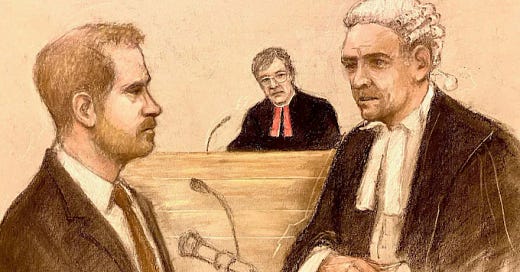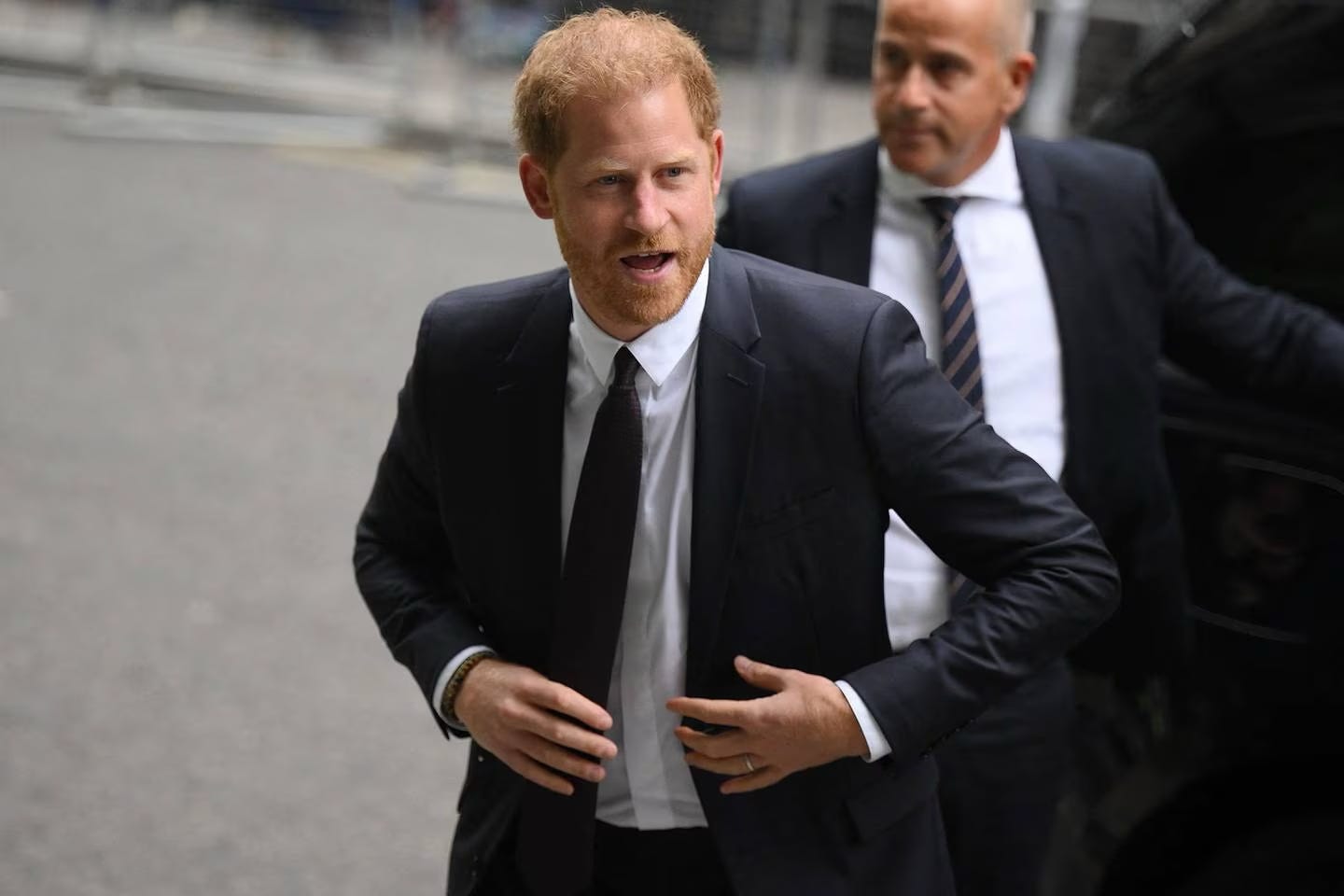Prince Harry Day 2: The Unravelling of a Sad Tale
The Duke of Sussex claims he's bringing this case to draw attention to journalistic malfeasance. But it seems much bigger to him than that
This Substack story is free to everyone. If you enjoy HRH RoyalTea please add us to your Substack reading list with the button below
Day Two of Prince Harry’s cross-examination in London concluded on Wednesday. At this stage in the game, we are all well-acquainted with the Sussex Paradox: Prince Harry and his wife Meghan Markle abhor the press, but they need it to survive. New York Times Columnist Mark Landler described the paradox as such in relation to the “near-catastrophic chase” in New York:
“The episode underscored a basic paradox in the lives of this celebrity couple: they plead for privacy, but also seek publicity, with a Netflix documentary, a tell-all memoir by Harry and public appearances that will inevitably draw cameras.”
Harry dreams of a private life, in which he can still be the center of attention and just as important as the “Heir”. The Sussexes tell the world that all they want is for press to stop writing stories about them. For some reason, they then do televised interviews and podcasts and release tell-all memoirs. They then suggest that the media has ruined their lives by speaking about the interviews, podcasts, shows and books they’ve released, fully in the knowledge of everything the media has given them.
It’s hard not to have sympathy for two people who’s lives are predicated on such a sharply delineated contradiction
Reading HRH RoyalTea, it may come across as though I do not have sympathy for the Prince Harry and the Duchess of Sussex. But that’s not true. It’s hard not to have sympathy for two people whose lives are predicated on such a sharply delineated contradiction. Achieving inner peace seems a distant fantasy for anyone operating under these conditions. And it was clear on Tuesday, as Harry delivered “evidence” in his case against the Daily Mirror Group for alleged unlawful information gathering.
No matter the personal feelings anyone holds for the Sussexes (me included) – and they tend to inspire intense affection or ferocious animus – we were given a front row seat to watching a sad tale unravel about a man driven to madness by his hatred of the media. The press intrusion started when he was at school, and followed him into early adulthood.
Nothing in his life, his lawyer David Sherborne says, “was sacrosanct or out of bounds”. Sensitive details about his familial relationships – including claims about how he was handling his parents’ divorce – were all fair game. Articles with details of his location and movements troubled him greatly, too. He even suggests that seeds of distrust between him and his brother were sowed by the Daily Mirror Group. “Every one of those articles played a destructive role in my growing up,” he says.
He wants to expose the press’s rotten soul. He might need to hold off on the victory march just yet.
Harry claims he is bringing this case to draw attention to journalistic malfeasance. He’s doing this to “stop the harassment of the press against his wife”. But it seems bigger to him than that: he wants to expose the press’s rotten soul. He might need to hold off on the victory march just yet.
Andrew Green KC, the lawyer for Mirror Group Newspapers, has done a good job in court pointing out some inconsistencies.
How could Harry’s phone have been hacked at a time when he did not own one?
Is it really fair to accuse a journalist of unlawful information gathering when the details of their story were already in the public domain?
Is there anything more specific he wants to point to beyond general speculation?
This is tragicomedy at its peak. The general contours of Harry’s argument are basically right: the press was intrusive, and a corrosive atmosphere was cultivated and allowed to fester for years, at some point everyone lost their minds and lost any sense of boundaries. But everything else about Harry comes across as a little wrong: His self-righteousness, his inability to see his contradictions, his desire to have it all without any of the consequences.
In fact, it is precisely that lack of self-awareness that draws in most of his critics. Harry thinks he is a reformed and mature man. But in a written statement submitted to the court he says he ended up playing up to a lot of the headlines and stereotypes. The tabloids, he contends, coaxed him into his bad behavior: “If they are printing this rubbish about me and people were believing it, I may as well ‘do the crime’, so to speak.”
“Do the crime so to speak?” The Press forced him to abuse drugs and barely scrape by with two A-Levels in school? This is laughable.
For a man attempting to prove he’s now a grown up, this is a rather odd way to do so. And worse than that, Harry is standing up in court lamenting the damage the press wrought on his private life. He seems to have forgotten that his own book Spare hardly demonstrated a great deal of concern for his family’s privacy. There is no doubt that some of Harry’s life is thoroughly unenviable. And his feelings are definitely real, maybe even his motivations are pure. But he is a terribly inconsistent person too.
Despite having repeatedly accused the palace of briefing against him, Harry appeared unwilling to accept that some stories had been published by MGN because the palace had, in fact, officially briefed them. An email showing that they had received a tip from a bystander? Could’ve been faked, according to Harry.
The question, when it comes to Harry, is always the same. Is he a hypocrite, or a terribly damaged young man? Is he a sensitive lamb or a spoiled brat? Self-absorbed or genuinely concerned? To which there can only be one answer: He’s all of them. And the absence of his wife during his time of need speaks volumes.
-L.S.







